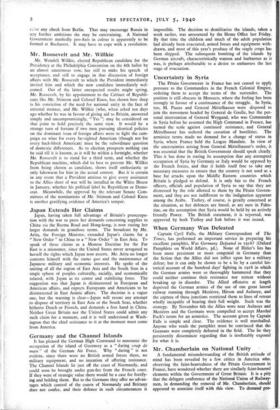Uncertainty in Syria
The Petain Government in France has not ceased to apply pressure to the Commanders in the French Colonial Empire, ordering them to accept the terms of the surrender. The position is still obscure in Morocco, where the feeling has been strongly in favour of a continuance of the struggle. In Syria, too, M. Puaux and General Mittelhauser were disposed to join the movement headed by General de Gaulle, but the per- sonal intervention of General Weygand, who was Commander in Syria before he assumed the High Command in France, has turned the scale against continued resistance, and General Mittelhauser has ordered the cessation of hostilities. The armistice terms made no demand for a change of status in Syria, where France held the League Mandate. In view of the uncertainties arising from General Mittelhauser's order, it was essential that the British Government should speak clearly. This it has done in stating its assumption that any attempted occupation of Syria by Germany or Italy would be opposed by the French forces, and that it holds itself free to take any necessary measures to ensure that the country is not used as a base for attacks upon the Middle Eastern countries which Britain is pledged to defend. It is only fair to the French officers, officials and population of Syria to say that they are distressed by the role allotted to them by the Petain Govern- ment, and they are not indifferent to the indignation apparent among the Arabs. Turkey, of course, is greatly concerned at the situation, as her defences are based, as are ours in Pales- tine, on the assumption that Syria would be held by an actively friendly Power. The British statement, it is reported, was approved by both Turkey and Irak before it was issued.






























 Previous page
Previous page